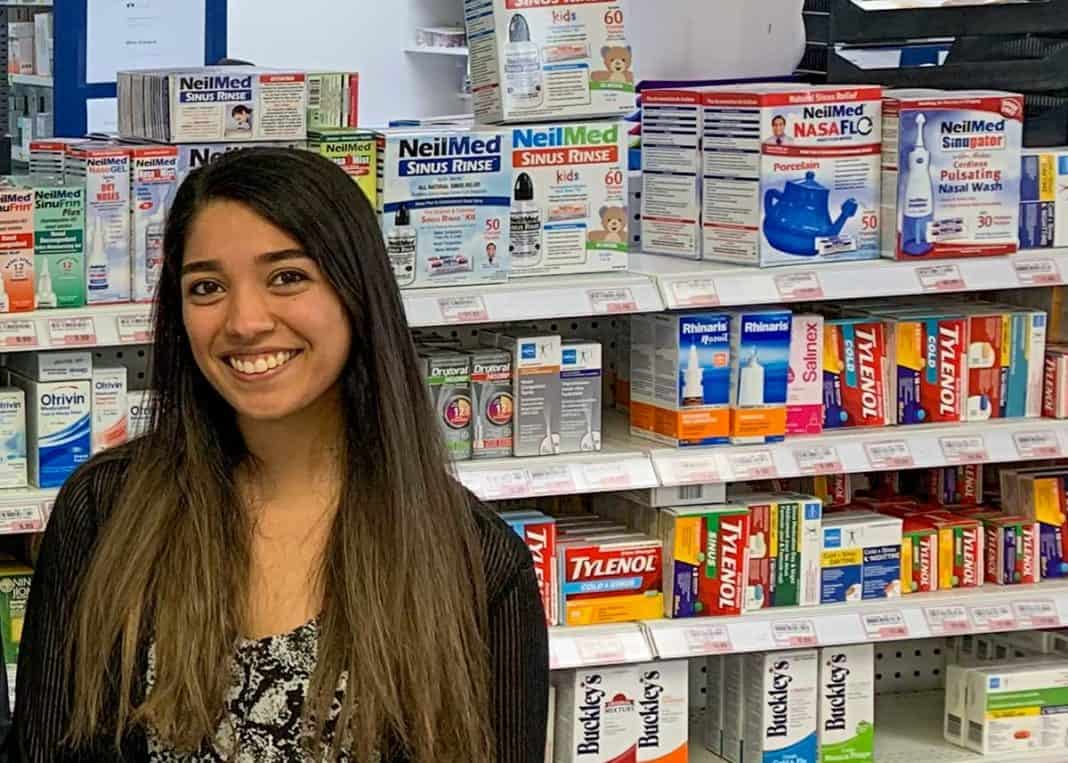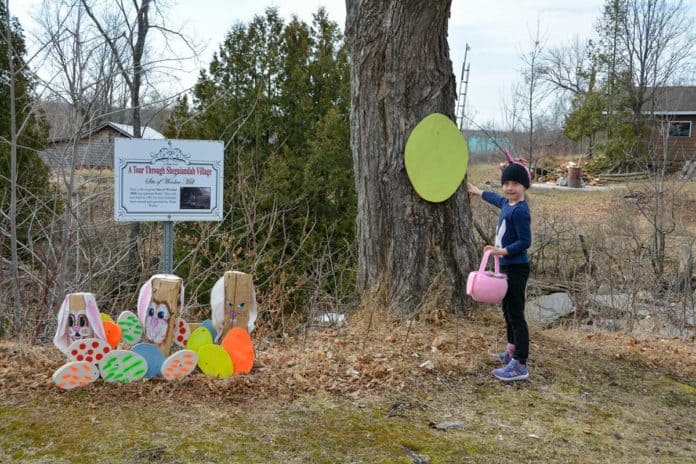VAUGHAN – An Island-trained pharmacist is working in the intensive care unit (ICU) at Ontario’s first designated COVID-19 hospital and says although the growing third wave is deeply straining the health care sector, her training at Manitoulin Health Centre (MHC) has prepared her for the most challenging health crisis in a generation.
“When I had interviewed for this specific critical care position, I was told that my experience on the Island at MHC was one of the reasons why I’d be a really successful person in the ICU, because the training I got is unlike any other training program available to graduating pharmacy students,” said Naushin Hooda, the clinical liaison critical care pharmacist (which is to say, the full-time ICU pharmacist) at the COVID hospital.
Dr. Hooda, who completed a placement at MHC in 2019 as part of her University of Waterloo doctor of pharmacy degree, applied to work at Cortellucci Vaughan Hospital before it transitioned into the province’s designated COVID-19 care centre.
It fulfilled a lot of her goals: it is Ontario’s first ‘smart hospital,’ filled with modern technologies that can better aid health care staff in improving health outcomes, the team leading the centre seemed forward-thinking and innovative, which spoke to her interests as a new pharmacist, and it was also close to home.
There were two pharmacist positions available at the time: the ICU position or a floating role between different departments. Dr. Hooda felt specializing in one area would suit her better so she opted for that position, though the ICU still has a large degree of variety.
“ICU is one of the most challenging therapeutic areas you can go in. It’s a completely different style of medicine because you’re no longer treating a single condition; there’s often multiple, and some get treated at the detriment of others so there’s a huge balance involved,” she said.
When Ontario declared the Vaughan hospital the main COVID-19 treatment centre in early February, just after she started working there, she knew she was in for a challenge.
“Most survival rates in ICU are lower than other units and, by nature of that, there’s a bit of an emotional toll you experience every day,” Dr. Hooda said. “Most of my patients are ventilated and they’re sedated as well, so I don’t even get to speak with the patients or really see many positive outcomes.”
As many doctors have attested in recent weeks, the average age of COVID-19 patients in hospitals is dropping fast. While the first two waves of the virus have largely had their worst impacts on older populations, new variants of concern that are driving the third wave are ferociously impacting younger people.
This is partly because many young people work in public-facing jobs that Ontario has deemed ‘essential’ despite a recent shutdown (a new lockdown category that Ontario introduced at the beginning of the month), and partly because young people tend to have more social contacts than older demographics.
Additionally, the new variants seem to spread much easier and cause more severe illness than the original strain of the virus.
“The (ages of) patients are getting younger that are coming into the ICU,” she said. “We’re starting to see whole families in ICU; mom, dad and kids.”
The hospital has closed off many of its other services and transferred those to other hospitals in York Region’s Mackenzie Health system, allowing the ICU to expand into other areas.
“We want to be part of speaking to patients, helping them transition to getting back home, but now in the ICU (‘home’ is) not the terminology we use. Now it’s about how we can keep them alive and get them well enough to transition to another part of the hospital,” said Dr. Hooda.
She is the only full-time pharmacist in the ICU, alongside two others that spend some of their time in that area. There are, however, other pharmacists elsewhere in the hospital that can offer advice and support when needed.
The small staff means many long hours, such as an Easter Sunday shift, and being available in off-hours in case the pharmacist on shift needs advice or suggestions.
“It is exhausting. I think I just try to stay hopeful that it’s going to end soon, and knowing that the role I have is actually making a huge difference in people’s and families’ lives,” she said.
Much of her downtime involves learning new best practices that seem to change on a daily basis as the knowledge base evolves.
Dr. Hooda recently got her second vaccine dose. While it was a relief to lower her risk of bringing the virus home to her family, she said it hasn’t had a major impact on the morale of her team.
“With the people I work with, we came into health care not because we were worried about ourselves but because we care about others. Being vaccinated protects us, yes, but we’ve always been most worried about the people out there,” she said, and credited her teams for their ongoing support and hard work to adapt as best they can.
“It’s one thing to go through something that’s really scary and really new and uncertain, but another to have people by your side going through the exact same thing as you and being open to answering any questions.”
She credits two main parts of her Island placements at MHC and Guardian Pharmacy as key to her success in ICU. First, reporting directly to MHC physicians, rather than having an experienced pharmacist as an intermediary (as is common practice in placements), forced her to learn quickly and make decisions based on her best judgement of the situation.
Second, MHC offered an interdisciplinary practi-cum that involved working with other departments and the hospital administration to create a holistic way to address care needs.
“When you’re in the ICU, the model is very similar in that you’re expected to be a pharmacotherapy expert and answer questions related to drug therapy without hesitation. The model on Manitoulin is very similar to an ICU,” she said.
Dr. Hooda said she is very thankful for the “once-in-a-lifetime” opportunity at MHC and for the organizers at University of Waterloo for planning that rotation.
“That was the single training I had prior to being an ICU pharmacist; without it, I don’t know if I could have accepted the role I am in,” she said. “My manager was right, my experience on the Island prepared me so well. I couldn’t have asked for a better experience.”
Her education journey continues. In the midst of her shifts at Cortellucci Vaughan Hospital, she is working toward a master of public health degree at Johns Hopkins University’s Bloomberg School of Public Health.
The school has allowed her to take a reduced course load and instructors have accommodated her work situation, a comforting measure for Dr. Hooda.
Many health care workers have urged the public to follow public health measures as case numbers grow rapidly across Ontario, hospitals exceed capacity and staff, the most fragile part of the care scheme, face widespread burnout.
Staying home unless necessary, limiting social contacts, frequent handwashing, wearing masks and staying two metres apart from others are small measures that can prevent spreading COVID-19, including the newer variants.





